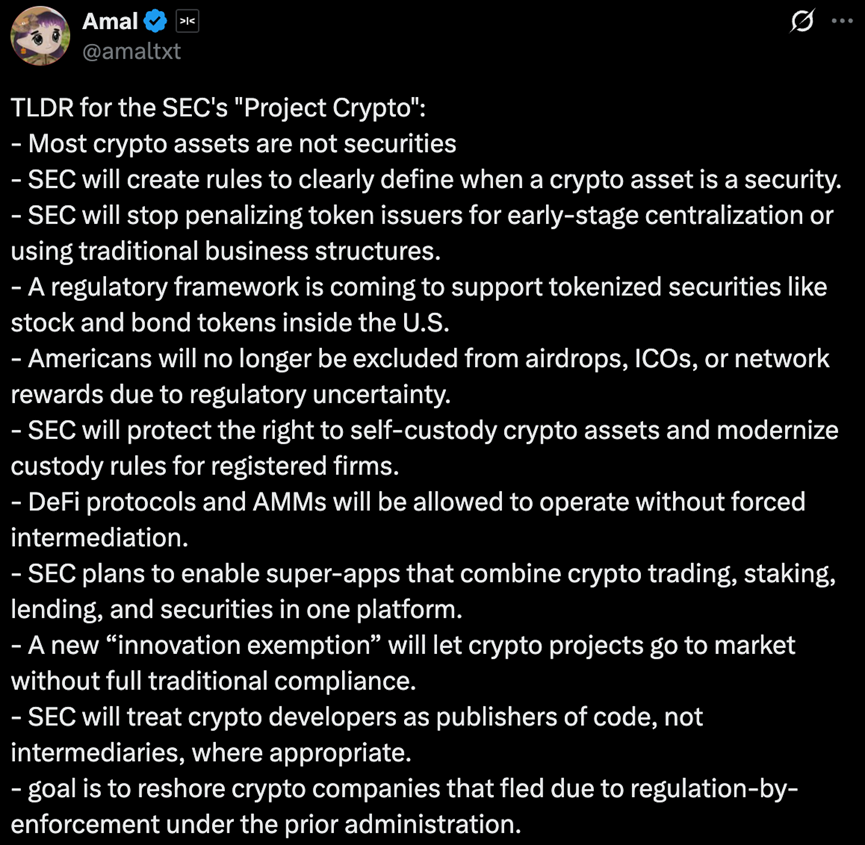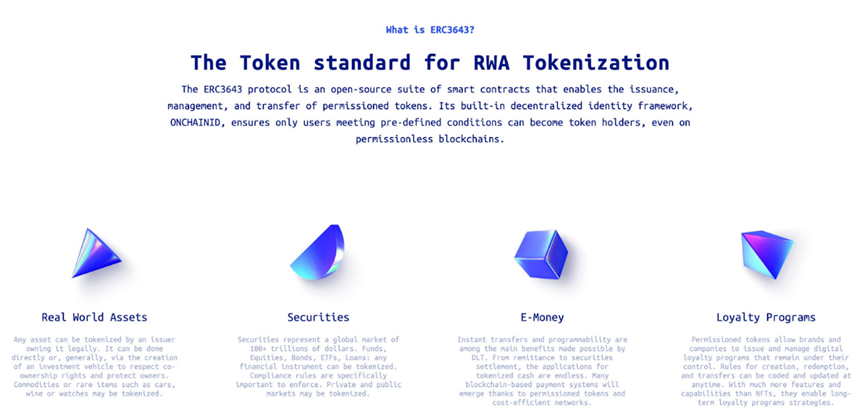Author: TPan
Compiled by Felix, PANews
The Chairman of the U.S. Securities and Exchange Commission (SEC) today launched Project Crypto, an initiative aimed at supporting cryptocurrency innovation in the United States. While there had been some signs of progress (e.g., physical redemptions of exchange-traded funds (ETPs) and a decline in lawsuits and investigations against Binance, Coinbase, Crypto.com, Immutable, Yuga, Kraken, Gemini, Consensys, OpenSea, Uniswap, and many others), this move not only reverses the damage done over the past few years but also lays a solid foundation for the next phase of development in the U.S. cryptocurrency sector.
To be honest, when I read Chairman Paul Atkins' speech, I had not yet recovered psychologically from the SEC's crackdown on the crypto industry in the past few years.
The following figure shows the key points shared by Amal from Dragonfly. Some of these key points and potential impacts will be elaborated in more detail below.
Summary of the SEC’s “Crypto Project”:
- Most crypto assets are not securities
- The SEC will develop rules to clearly define when crypto assets constitute securities.
- The SEC will stop penalizing early-stage token issuers that are centralized or use traditional business structures.
- A regulatory framework is about to be introduced to support tokenized securities such as stock and bond tokens within the United States.
- Americans will no longer be excluded from airdrops, ICOs, or network rewards due to regulatory uncertainty.
- The SEC will protect the right to self-custody of crypto assets and update custody rules for registered firms.
- DeFi protocols and automated market makers (AMMs) will be allowed to operate without forced intermediaries.
- The SEC plans to launch a super app that will integrate crypto trading, staking, lending, and securities on a single platform.
- The new “innovation exemption” will allow crypto projects to enter the market without having to fully comply with traditional regulations.
- The SEC will, where appropriate, treat cryptocurrency developers as publishers of code rather than intermediaries.
- The goal is to bring back cryptocurrency companies that fled due to regulations imposed by the previous administration.

Cryptoasset classification
“I have directed Commission staff to develop clear guidance so that market participants can determine whether crypto-assets are securities or constitute investment contracts. Our goal is to help market participants categorize crypto-assets as, for example, digital collectibles, digital commodities, or stablecoins, and assess the economic substance of transactions. This approach will allow market participants to determine whether there is an ongoing commitment or obligation on the part of the issuer to determine whether the asset constitutes an investment contract, based on clear guidance.”
This statement is noteworthy for the following reasons:
- The SEC recognizes the richness of the crypto ecosystem and supports the creation of many different types of assets. When the average person hears the term "cryptocurrency," they think of Bitcoin or their favorite memecoin. But in reality, crypto assets are much more diverse than that, and not every asset should be treated the same.
- Specifically, with respect to NFTs (“digital collectibles”), the SEC filed a lawsuit against Stoner Cats in September 2023, accusing it of issuing NFTs without registration.
The SEC recognizes that its past enforcement-style actions are no longer appropriate and will develop (rather than enforce) sensible guidelines that give builders and creators the space to thrive.
Imagine if your Labubu collection had to be registered with the SEC.
Rules and guidelines cannot be one-size-fits-all and need to recognize the nuances of each asset type.
Including Americans in token rewards
“I have asked staff to propose specialized disclosures, exemptions, and safe harbors, including for so-called ‘initial coin offerings,’ ‘airdrops,’ and network rewards. For these types of transactions, our goal should be to move issuers away from excluding U.S. users from their distributions due to legal complexity and litigation risk, and instead toward including U.S. users in order to benefit from legal certainty and a lighter regulatory environment.”
If you’re based in the US (and a handful of other jurisdictions) and actively involved in different projects, platforms, and protocols, you’ve probably encountered a page like this when trying to claim an airdrop:

Do these projects have a problem with the US? No, they're simply concerned about the legal or regulatory risks of offering rewards to users in certain countries. Crypto projects aim to eliminate these restrictions, thereby no longer "protecting" US users.
The obvious beneficiaries of this regulation will be US users, followed closely by the projects themselves and their builders.
Less legal risk, less emotional burden, and most importantly, less friction. Users don't have to fiddle with VPNs or other methods to claim their airdrops. Meanwhile, teams can better understand the effectiveness of their months-long efforts and focus on more important matters.
Innovation exemption
“Under my vision for an innovation exemption, innovators and visionaries would be able to enter the market immediately with new technologies and business models without being subject to incompatible or burdensome prescriptive regulatory requirements that hinder economic activity. Instead, they would be subject to certain principles-based conditions designed to achieve the core policy objectives of the federal securities laws. These conditions could include a commitment to periodic reporting to the Commission, the adoption of whitelisting or “validator pool” functionality, and the restriction of circulation to only security tokens that meet standards for compliance functionality, such as ERC3643.”
This section is interesting because it mentions ERC-3643, an open-source token standard for tokenizing RWAs. The SEC recognizes that the industry has been working to build a framework that will complement their upcoming guidance.

Unlike the wait-and-see approach of the past, builders can continue to push the boundaries of on-chain applications. They no longer need to think “outside the box” but instead build on existing frameworks and expand upon them.
Why is this important?
Obviously, this is crucial for industry legal professionals, but it is equally important for operators of all types and roles to keep a close eye on these developments.
The lines between strictly prohibited conduct and fair competition remain blurred, but they are shifting in favor of creativity. Many mechanisms of the past will no longer be seen as risky moves, but as strategies or tactics that can be optimized and expanded. Great ideas once rejected by legal departments can now be revisited with greater confidence.
I applaud the SEC for this shift. I look forward to a new chapter in the US and around the world where these ideas are permitted and possible.
Related Reading: Full Text of the SEC Chairman's "Crypto Plan" Speech: Fully Bringing Financial Markets to the Blockchain, Building a Global Crypto Capital







